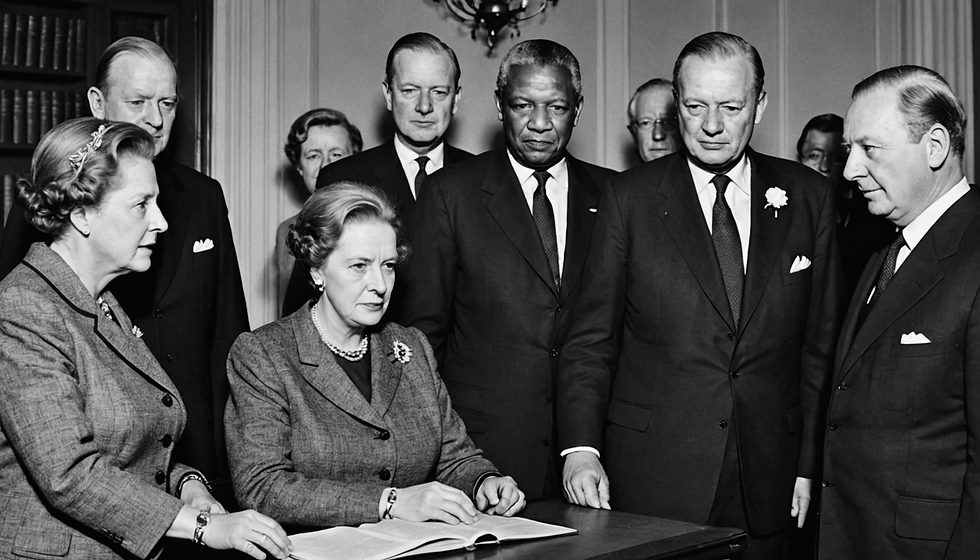Hard vs. soft power in negotiations/conflict resolution (Zelensky/Trump) case study
- R.M. Boylan

- Mar 1
- 3 min read
R.M. Boylan, BSc. M.A.

Difference Between Soft Power & Hard Power
Soft Power
Soft power, a term coined by Joseph Nye in the late 1980s, refers to the ability of a country to influence others through attraction and persuasion rather than coercion or force. It encompasses cultural influence, diplomatic relationships, and the promotion of values and ideals. Soft power is often exercised through non-military means such as diplomacy, cultural exchanges, and humanitarian aid.
Hard Power
Hard power refers to the use of coercive tactics to influence the behavior of other states or groups, primarily through military force or economic sanctions. It relies on tangible resources such as military capability and economic incentives or penalties.
Hard Power: President Donald Trump & Prime Minister Zelensky of Ukraine
Maximum power score 55%
Objectives achieved: No
This is an example of the use of authoritative power, positional power & coercive power.
Only time will tell whether this 55% distribution of power forms are effective in leadership at creating a world of peace, economic progress, human flourishing and cooperation.
Soft Power
Prime Minister Sir Keir Starmer & King Charles
Maximum power score: 75%-85%
Objectives achieved: Yes
Yesterday, I shared an example of soft power in action. The instance was Prime Minister Sir Keir Starmer's visit to the White House, where he extended a cordial invitation from King Charles to Mr. Trump. This timing was intended to set the stage for productive rather than contentious negotiations.
In this scenario, both Sir Keir Starmer and King Charles employed soft power in their strategies. They utilized positional, authoritative, referent, and reward power. Put simply, the effectiveness of these power forms could reach up to 85%, yet neither coercive nor hard power was applied. The objective was accomplished swiftly through a softer, more diplomatic method.
The question for everyone would be which approach would make you change behaviour or your point of view?
Examples of Soft Power in Global Peace Conflicts
Nelson Mandela and South Africa: Mandela's approach to reconciliation and nation-building post-apartheid showcased soft power by promoting forgiveness and unity rather than retribution.
The European Union: The EU has used soft power to foster peace in Europe after World War II through economic cooperation and integration, promoting stability and preventing conflict.
UN Peacekeeping Missions: The United Nations employs soft power through peacekeeping missions that focus on diplomacy and rebuilding societies rather than military intervention.
When Hard Power Works Better
Immediate Threats: Hard power can be effective in situations where there is an immediate and clear threat, such as military aggression from another state. For example, the U.S. intervention in World War II was a decisive use of hard power that ultimately led to the defeat of Axis powers.
Deterrence: The presence of military strength can deter potential aggressors from taking hostile actions, as seen during the Cold War with the concept of mutually assured destruction (MAD).
Restoration of Order: In cases of severe instability or humanitarian crises, such as a NATO intervention may be required, hard power may be necessary to restore order and protect civilians.
Why Hard Power Often Fails
Resistance and Resentment: Use of hard power can lead to resentment and resistance among the local population, when military intervention led to long-term instability and insurgency.
Limited Scope: Hard power often fails to address the underlying causes of conflict, such as poverty, inequality, or political oppression, making it a temporary solution at best.
International Relations: Over-reliance on hard power can damage a country's reputation and relationships with other nations, undermining its soft power and diplomatic efforts.
Conclusion
In summary, while hard power can be effective in certain situations, particularly in immediate threats or crises, it often fails to provide sustainable solutions to global peace conflicts. Soft power, on the other hand, offers a more constructive approach to fostering long-term peace and stability through diplomacy and cultural engagement.





Comments